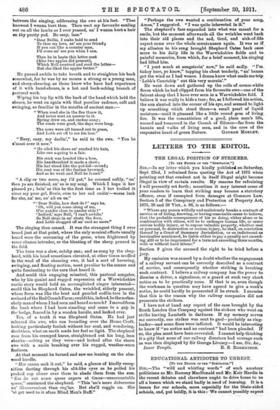LETTERS TO THE EDITOR.
THE LEGAL POSITION OF STRIKERS. [To THE EDITOR or THE "SPECTATOR:9
Sin,—In my letter which you kindly published on Saturday, Sept. 23rd, I refrained from quoting the Act of 1875 when pointing out that conduct not in itself illegal might become illegal in view of certain results. My reasons for refraining I will presently set forth ; meantime it may interest some of your readers to learn that striking may become a statutory offence, even if exempted from damages at Common Law.
Section 5 of the Conspiracy and Protection of Property Act, 1875, 38 and 39 Viet., c. 86, is as follows s- " Where any person wilfully and maliciously breaks a contract of service or of hiring, knowing, or having reasonable cause to believe, that the probable consequences of his so doing, either alone or in combination with others, will be to endanger human life, or cause serious bodily injury, or to expose valuable property, whether real or personal, to destruction or serious injury, he shall, on conviction thereof by a Court of Summary Jurisdiction, or on indictment as hereinafter mentioned, be liable either to pay a penalty not exceed- ing £20 or to be imprisoned for a term not exceeding three months, with or without hard labour?'
Section 9 gives the accused the right to be tried before a jury.
My omission was caused by a doubt whether the engagement of a railway servant can be correctly described as a contract of service, and consequently whether striking is breaking such contract. I believe a railway company has the power to dismiss a driver, a signalman, or a guard at such very short notice as to be practically none. If that is so, even though the workman in question may have agreed to give a week's notice, he could hardly be prosecuted if he struck. I surmise that this is the reason why the railway companies did not prosecute the strikers.
I have not at hand any report of the case brought by the South London Gas Company against the stokers who went on strike leaving Lambeth in darkness. If my memory serves me correctly, one striker was sent to gaol—probably as ring-
leader—and some fines Were-inflicted. It would be interesting to know if "no notice and no contract" had been pleaded. If
so, the plea must have been overruled. I cannot help thinking it a pity that none of our railway directors had courage such as was then displayed by Si George Livesey.—I am, Sir, &c.,










































 Previous page
Previous page